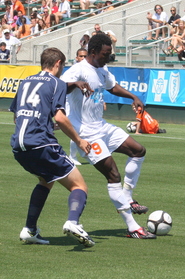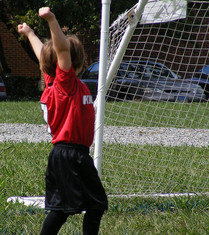1 Kings 19:8 ...he arose, and did eat and drink, and went in the strength of that meat forty days and forty nights... KJV
Succulent Soccer

World-wide, soccer players are known to say "Yo la tengo" when they are in control of the ball. This translates into "I got it." My question is, "Do we got it when it comes to sound nutrition advice?"
If we can plow through the nutrition quackery, the unhealthy family gatherings, the restaurant commercials that bombard your brain every night, and the sugar addiction parties at church, we can find sound nutrition advice. Is does exist. Congratulations! You have just been rescued by a registered dietitian.
Here is a taste of what practicing a good sports-nutrition lifestyle looks like:
Enjoy your food without negative feelings like guilt and without bad company like whoever disrepects. We have been punished enough. Eat what you want and relax a bit.
Then, if you really want to make positive changes in your lifestyle, including nutrition choices, live with someone whose has them. Modeling is an effective tool for most people who really want change. If you do not want to improve then there is an even more clever technique...pray. I cannot hide the truth. It is what it is.
Eat a variety of foods including all colors of fruits and vegetables whenever possible. Daily is recommended.
Take your time when cooking and eating and practice thankfulness because it is important and may even aid in digestion and absorption of nutrients. This includes thinking about all the energy it took to get the dish to you. Stop and smell the edible flowers, so to speak.
Plan your snacks and meals taking into consideration all six major nutrients that the human body needs: carbohydrates, lipids (fats), proteins, vitamins, minerals, and most importantly, water.
Remember, a registered dietitian can help with keeping you up-to-date with current research and setting realistic goals. A team of nutrition experts can aid in identifying road blocks that may have kept optimum nutrition from being achieved in your sports career.
Downloadable facts sheets are available at: www.eatright.org
Look for Nancy Clark's Food Guide for Soccer Players
If we can plow through the nutrition quackery, the unhealthy family gatherings, the restaurant commercials that bombard your brain every night, and the sugar addiction parties at church, we can find sound nutrition advice. Is does exist. Congratulations! You have just been rescued by a registered dietitian.
Here is a taste of what practicing a good sports-nutrition lifestyle looks like:
Enjoy your food without negative feelings like guilt and without bad company like whoever disrepects. We have been punished enough. Eat what you want and relax a bit.
Then, if you really want to make positive changes in your lifestyle, including nutrition choices, live with someone whose has them. Modeling is an effective tool for most people who really want change. If you do not want to improve then there is an even more clever technique...pray. I cannot hide the truth. It is what it is.
Eat a variety of foods including all colors of fruits and vegetables whenever possible. Daily is recommended.
Take your time when cooking and eating and practice thankfulness because it is important and may even aid in digestion and absorption of nutrients. This includes thinking about all the energy it took to get the dish to you. Stop and smell the edible flowers, so to speak.
Plan your snacks and meals taking into consideration all six major nutrients that the human body needs: carbohydrates, lipids (fats), proteins, vitamins, minerals, and most importantly, water.
Remember, a registered dietitian can help with keeping you up-to-date with current research and setting realistic goals. A team of nutrition experts can aid in identifying road blocks that may have kept optimum nutrition from being achieved in your sports career.
Downloadable facts sheets are available at: www.eatright.org
Look for Nancy Clark's Food Guide for Soccer Players
For coaches

It takes a team effort to educate. Coaches are an integral part of communicating sound nutrition advice. People, especially children and young adults, search for identity by nature and will often follow advice of persons in authority without questioning them. If you oversee a body of athletes and you yourself have malnutrition habits (under/over eating), consult with a registered dietitian on a routine basis. If you do not get the results you want, consult with additional registered dietitians. It's a new day. There is more research available to help narrow down what works and what doesn't. Practicing multiple approaches to achieve sports-related nutrition goals is key to success.
Advice about what to eat before and during exercise must take into consideration of the individual athlete. Each person's DNA and digestive tract is metabolically unique. Athletes can gradually discover the best choices for their bodies by experimenting with a variety of fluids, foods, and eating patterns before, during, and after practice. In contrast, the wrong food choices can sabotage peak performance. Be wise. The right foods in the right amounts can optimize your chances for success.
compliments of Nancy Clark
Advice about what to eat before and during exercise must take into consideration of the individual athlete. Each person's DNA and digestive tract is metabolically unique. Athletes can gradually discover the best choices for their bodies by experimenting with a variety of fluids, foods, and eating patterns before, during, and after practice. In contrast, the wrong food choices can sabotage peak performance. Be wise. The right foods in the right amounts can optimize your chances for success.
compliments of Nancy Clark
Athletes & eating disorders
Soccer athletes, young and old, are at risk of developing disordered eating, eating disorders, and for women, the Female Athlete Triad. Possible contributing factors include:
-nutrition misinformation taught by coaching/training staff
-competitive schedules that leave little time for eating adequately
-sports-related misconceptions, such as "The leaner you are the faster you can run."
-the portrayal of athletes as sex symbols with the associated pressure to meet unreasonable body shapes
-a career-ending injury that is not appropriately addressed by the athletes's support system
-commenting negatively on body weight, shapes and what is being eaten
-praising people for unhealthy weight loss practices
-ignoring the body's natural cues to regulate eating (eg. hunger, appetite, fullness, and cravings)
-failing to teach respectful refusal of foods
-not identifying healthy outlets for stress and difficult feelings (note: environment of media can influence this)
-recommending weight loss as a method to "feel better about yourself" (self-acceptance and care must come first to achieve lasting health)
-failing to seek professional help for those struggling with weight or eating issues
-recommending diets
-nutrition misinformation taught by coaching/training staff
-competitive schedules that leave little time for eating adequately
-sports-related misconceptions, such as "The leaner you are the faster you can run."
-the portrayal of athletes as sex symbols with the associated pressure to meet unreasonable body shapes
-a career-ending injury that is not appropriately addressed by the athletes's support system
-commenting negatively on body weight, shapes and what is being eaten
-praising people for unhealthy weight loss practices
-ignoring the body's natural cues to regulate eating (eg. hunger, appetite, fullness, and cravings)
-failing to teach respectful refusal of foods
-not identifying healthy outlets for stress and difficult feelings (note: environment of media can influence this)
-recommending weight loss as a method to "feel better about yourself" (self-acceptance and care must come first to achieve lasting health)
-failing to seek professional help for those struggling with weight or eating issues
-recommending diets
